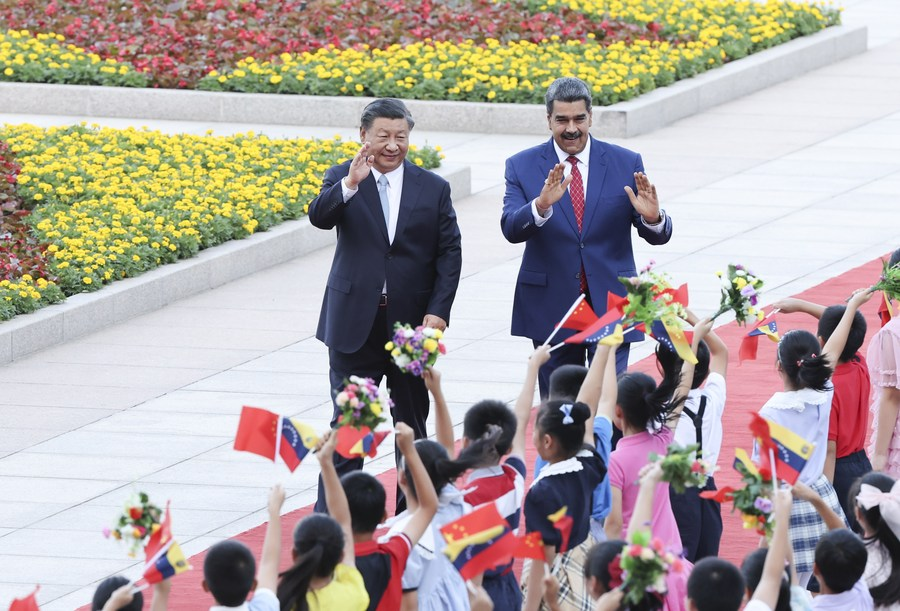Chinese train company, questioned in Latin America, under investigation in Europe
- Gabriele Iuvinale

- 29 mar 2024
- Tempo di lettura: 4 min
The European Commission (EC) has opened an investigation to determine whether the state subsidies the Chinese train manufacturing company China Railway Rolling Stock Corporation (CRRC) received, have allowed it to compete with an undue advantage in a public tender for electric trains and maintenance services.
File photo. A CRRC stand at a transport exhibition in Hangzhou, China, December 4, 2020. (CFOTO/NurPhoto via AFP)
“A company should win, offer the lowest price or the best offer because it is the most efficient, because it has lower costs, it does it better, there are better processes, etc.,” Andrea Alvarado, a Chilean economist and grant expert, told Diálogo on March 12.
“If you are receiving a subsidy, what you are reflecting is not your better efficiency, you are reflecting the existence of the subsidy.”
The investigation covers the CRRC Qingdao Sifang Locomotive unit, for its bid for a public contract obtained in Bulgaria for $665 million, to provide electric trains, maintenance, and staff training. This company is already widely questioned for its “reckless business” in Latin America, Alvarado said.
This is the first time the EC has opened an in-depth investigation under its strict new rules to crack down on companies receiving huge subsidies from non-EU governments, digital daily Politico reported.
“This action demonstrates the Commission’s resolve to preserve the integrity of the internal market,” the EC said on February 16. “This, ensures that beneficiaries of foreign subsidies cannot take advantage with an unfair advantage, to obtain public contracts in the EU to the detriment of fair competition.
“There are sufficient indications that this company has been granted a foreign subsidy which disrupts the internal market,” the Commission said. “CRRC may have made an unduly advantageous offer, which could cause other companies participating in the public procurement procedure to lose sales opportunities.”
CRRC is a company already known worldwide for its anti-competitive and borderline practices. In Latin America it won contracts in countries such as Chile and Bolivia, where violations and non-compliance in free competition and labor, among other issues, have come to light, Infobae reported.
In Chile, the CRRC-Temoinsa consortium was accused by its Spanish competitor CAF of making a “reckless offer” to Chile’s State railway company (EFE), with which it was awarded the manufacture of 32 new trains for the Melipilla and Batuco projects, for a total of $171 million. The Spanish firm filed a preparatory preliminary injunction before the Chilean Court for the Defense of Free Competition.
“This tender considered the option of electric trains or trains with rechargeable battery, in addition to their maintenance as an option for EFE. The CRRC-Temoinsa consortium bid electric and battery-powered trains, while CAF bid battery-powered trains,” CAF said, Chilean news site Bio-Bío reported in September 2023. “In the sole provision of battery trains, CRRC made a bid almost 40 percent lower than CAF, which is outside the reasonable parameters for this type of operation and raises doubts about its compliance and quality,” the company explained.
In November 2023, the Mexico City government fined CRRC close to $15 million for delays in the modernization of the Pink Line of the Metro Collective Transport System, Infobae reported.
Yet CRRC is not the only Chinese railroad company involved in bad practices in the countries where it does business.
Peru’s State Contracting Supervisory Body decided to temporarily disqualify China Railway No. 10 Engineering Group (CREC 10) for subcontracting another company to build the Viru Viru bridge in Huancavelica province, Peru21 reported. The Chinese state-owned company also has a history of labor violations, such as not paying salaries and bonuses, in addition to multiple complaints for not respecting working hours.
In Bolivia, CREC was among a group of Chinese companies that were awarded large works in late 2022, Bolivian news site Urgente.bo reported. The problems detected in the contracts, both in terms of awards and loans, included confidentiality clauses and the contracting of Chinese companies as executors of works and suppliers of goods and services.
In addition, several projects where Chinese companies were involved in Bolivia did not have feasibility studies or market justification and suffered from discretionary changes in the contracts. According to Urgente.bo, there were also increases in the costs of the works, delays in their delivery, abundant quality defects, and non-compliance with the contracts.
Added to these issues is China’s increasing hold on such critical infrastructures through which essential food products, consumer goods, including hazardous chemicals are transported, raising concerns about breaches of systems with malicious intents and therefore having national security implications.
The misconduct of Chinese companies worldwide can also affect the market and the work of other companies.
“What happens with China is that they enter so aggressively in so many sectors and especially in the infrastructure construction sector in the world, that they are ‘devouring’ other companies,” Alvarado concluded. “It’s difficult to compete against a subsidized Chinese company. This causes other companies to lose the tender and points for the next bidding. This causes a market monopoly. That’s the problem with Chinese companies.”





Commenti